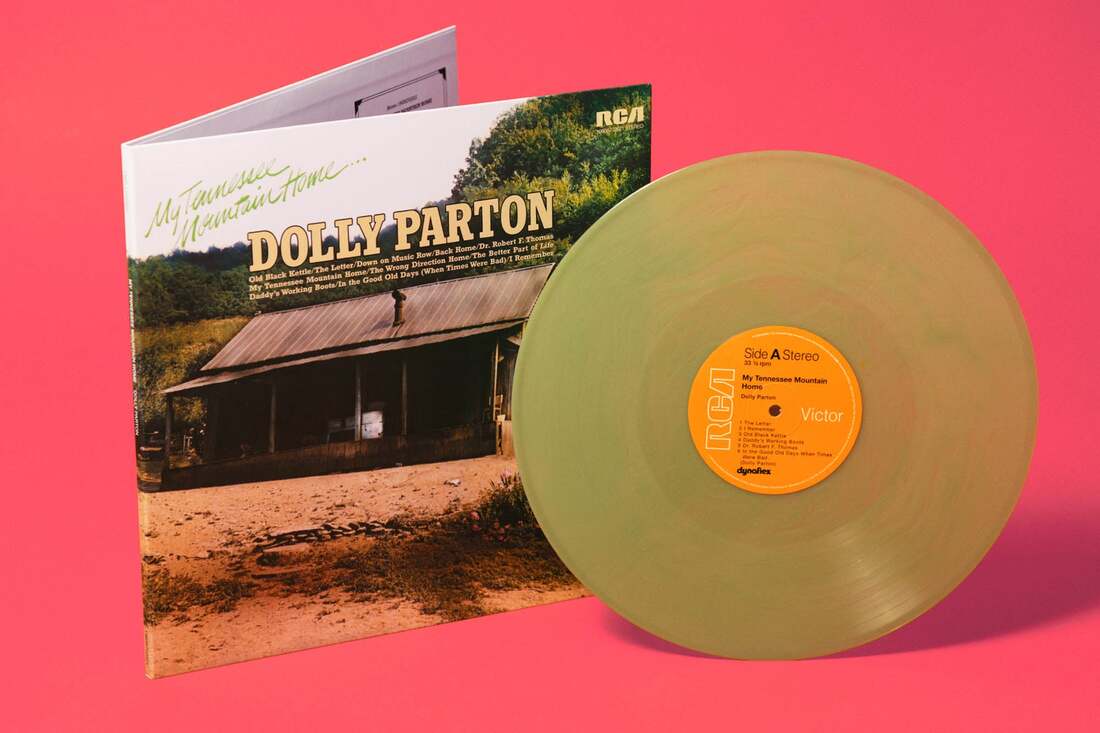|
by Ben Childers The first record in Dolly's 'Vinyl Me, Parton' subscription is her autobiographical 1973 album, My Tennessee Mountain Home. I received the record yesterday and it is stunning! The packaging is top notch and exceeds all expectations. The cover art is crisp a welcome upgrade to my original 1973 copy. Pressed on 180g Smoky Mountain Galaxy colored vinyl, the LP is vibrant and the audio is breathtakingly clear, thanks to remastering by Ryan Smith at Sterling Sound. Check out the unboxing video at the end of this review! My Tennessee Mountain Home is the perfect record to begin the 'Vinyl Me, Parton' subscription. The album, which celebrated its 50th anniversary on April 2, serves as a simultaneous introduction to both Dolly the artist and Dolly the person. Coincidentally, this month also marks 10 years since I fell in love with Dolly (after having gone to Dollywood several times throughout my youth and even seeing Dolly in a parade there). When I first immersed myself in Dolly's music I "inherited" (i.e. "pilfered and claimed as mine") several of her records from my grandparents record collection. Among those records was an original 1973 pressing of My Tennessee Mountain Home. I remember listening to this album for the first time in my small apartment in Oxford. The record took me on a journey through Dolly's formative years in the Smokies and once I had finished listening, I had a better understanding of who Dolly is. I could visualize it all, from the pain of leaving her home to pursue her dreams in Nashville to her mama's old black kettle and her daddy's working boots to her appreciation of how the bad times helped shape her as a person. The album opens with a spoken word track titled "The Letter", which is the first letter Dolly wrote back home to her parents after leaving for Nashville the day after her high school graduation. The letter sees Dolly telling her parents that she made it to Nashville okay, even though she is homesick for them and her noisy siblings. It paints a picture of a determined young woman ready to chase her dreams. This is followed by "I Remember", a song about Dolly's reminiscences of her parents during her childhood. She sings of remembering her mama's homemade gingerbread, her daddy's homemade toys, and how her parents filled the small home with love. The third track is "Old Black Kettle" and it follows in the same vein as the previous song, with Dolly reminiscing on moments and experiences from her childhood, specifically her mother cooking in an old black kettle on a stove with a broken door that had to be held closed with a "fork-ed" stick, which was eventually replaced with an electric range. The next track is dedicated to Dolly's dad, who she has often referred to as the smartest man she's ever known, despite the fact that he could not read or write. "Daddy's Working Boots" is an ode to her hard-working father and how the wear and tear on his boots are evidence to his hard work to support his family. Track 5 is dedicated to Dr. Robert F. Thomas and concludes Dolly's dedications to the most important figures in her life. Dr. Thomas delivered Dolly and was paid with a bag of cornmeal (and as Dolly says, she's "been raking in the dough ever since!"). The song tells how he delivered babies and cared for the people in East Tennessee, even when he had to travel by horseback or on foot to reach those who lived way back in the mountains where there were no roads. A re-recording of her 1969 single, "In the Good Old Days (When Times Were Bad)", from the album of the same name, follows. In the song Dolly states that while she is thankful for the bad times, no amount of money could convince her to go back and live through them again. Side two begins with the album's title track (and only single), "My Tennessee Mountain Home". The centerpiece of this concept album, it paints a beautiful picture of what a typical day was like for a young Dolly. The song makes mention of honeysuckle vines, eagles, songbirds, church, and porch swings. "The Wrong Direction Home" is sung by a homesick Dolly reminiscing on her mountain home, while having the go in the "wrong direction home" to follow her dreams. The next song, "Back Home", is about exactly what it sounds like. In the song Dolly is going back home to visit her parents in the Smokies after having been gone for some time. The penultimate track, "The Better Part of Life", calls back to the themes of "In the Good Old Days (When Times Were Bad)". The track shows Dolly feeling nostalgic for the swimming holes, possum grapes, and muscadines of her childhood. The album closes with "Down on Music Row", which recounts Dolly's first days in Nashville. She describes eating a stale sweet roll outside RCA, washing her face in the fountain at the Country Music Hall of Fame, and being turned down by record executives' secretaries who suggested she leave a tape and not wait to see them in person. The song even includes shout-outs to Chet Atkins and Bob Ferguson, who helped Dolly along her way to stardom. The album's cover was photographed by Dolly's uncle, Louis Owens, and depicts the house the Parton's lived in during the late 1940s and early 1950s. They had moved to another home by the time Dolly was in the third or fourth grade. The home was built in 1901. Dolly bought the property in 1987 and filmed a segment for her 1987 TV series on the front porch with her parents prior to restoring the home. The restored home can be seen briefly in Dolly’s 1990 TV Special, Christmas at Home. Overall, this ranks as one of Dolly's best albums from the early part of her career. She wrote every track on the album and it serves as an introduction to what Dolly is all about. If someone asked me what albums I would recommend to someone who had never heard a Dolly Parton album before, this album would definitely be among them. The album was produced by Bob Ferguson. Her parents, Lee and Avielee Parton, wrote the original liner notes. The 'Vinyl Me, Parton' re-issue includes new liner notes by Amileah Sutliff (available online through the Vinyl Me, Please website). Next month will see the first-ever vinyl release of Dolly's 2001 bluegrass album, Little Sparrow! If you haven't already, sign-up for Vinyl Me, Parton today!  Ben Childers is the administrator of The Dolly Parton Discography. A native of Tupelo, Mississippi, he grew up taking family vacations to the Smokies and Dollywood. His love for Dolly and her music reached a fanatical level in April 2013. After spending countless hours researching and cataloging Dolly's musical output, he decided to open a website dedicated to her discography. |
AdministratorBen Childers is the administrator of The Dolly Parton Discography. A native of Tupelo, Mississippi, he grew up taking family vacations to the Smokies and Dollywood. His love for Dolly and her music reached a fanatical level in April 2013. After spending countless hours researching and cataloging Dolly's musical output, he decided to open a website dedicated to her discography. Archives
July 2024
Categories
All
|
All album covers are copyrighted to their respective owners and are reproduced here in a sufficient resolution for commentary and identification, but lower resolution than the original image, and are intended for educational purposes only. Their use here is believed to qualify as fair use under the copyright law of the United States. All text is released under the Creative Commons Attribution-ShareAlike 4.0 International License and may be copied, distributed, and/or modified.
This website is not affiliated with Dolly Parton.


